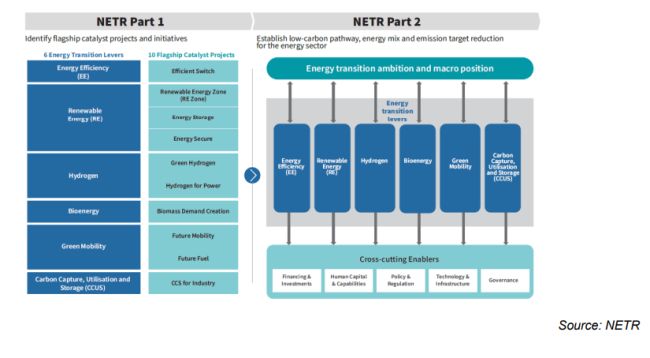The National Energy Transition Roadmap ("NETR") was launched on 27 July 2023 by the Ministry of Economy of Malaysia, setting out the roadmap to accelerate the country's energy transition and providing a framework for the country's shift from a traditional fossil fuel-based economy to a high value green economy. The two-part NETR covers the following:
Part 1 Outlines 10 flagship catalyst projects and initiatives based on six energy transition levers – (i) energy efficiency; (ii) renewable energy ("RE"); (iii) hydrogen; (iv) bioenergy; (v) green mobility; and (vi) carbon capture, utilisation and storage ("CCUS").
Part 2 Focuses on establishing the low-carbon pathway, national energy mix and emissions reduction targets, together with enablers needed for energy transition.
*Part 2 is expected to be announced in the coming months.

RE policies
In developing the NETR, the following decisions have been made by the Government of Malaysia:
- to increase the country's installed RE capacity from 40% in 2035 to 70% by 2050;
- to introduce the concept of a self-contained system according to the "willing buyer, willing seller" principle to the RE development framework;
- to increase the installation of solar systems on government buildings; and
- to allow cross-border RE trade through the establishment of an electricity exchange system, complementing the ASEAN power grid initiative.
Another key takeaway from the NETR is that the Government intends to reform the power sector by establishing a third party access ("TPA") framework to supply fuel sources, and broaden access to the grid infrastructure (possibly in the form of smart grid and/or TPA to the grid system) and the retail market.
Flagship catalyst projects
Some of the notable flagship projects identified under Part 1 of the NETR are as follows:
- Integrated RE Zone to be championed by Khazanah Nasional
Berhad
A large-scale, integrated sustainable development to be known as the RE Zone is to be established, encompassing an industrial park, zero-carbon city, residential development and data centre. - Solar Park to be championed by Tenaga Nasional Berhad
Centralised large scale solar parks to be co-developed by TNB with SMEs, cooperatives and state economic development corporations, at 100MW deployment per site across five sites in several - Hybrid Hydro-Floating Solar PV to be championed by Tenaga
Nasional Berhad
Potential development of up to 2.5GW of hybrid hydro-floating solar projects at hydro dam These plants are expected to act as energy storage outlets by conserving water during peak hours and discharging it during non-peak hours. - Sabah Energy Security Initiative
There will be an increase in the development of large-scale solar and small hydropower plants in Sabah to secure the state's long term energy supply. Policies are also to be formulated on biowaste and steps to be taken to consider the feasibility of geothermal for power generation. - Sarawak Hydrogen Hub to be championed by Sarawak Economic
Development Corporation
Three integrated projects to produce green hydrogen which comprises of a green hydrogen production plant in Kuching by 2025 for domestic use, and two plants in Bintulu by 2027, mainly for export purposes. - Biomass Clustering
The authorities will champion the development of potential biomass clusters with a centralised plant using aggregated feedstock from nearby mills. - Regulatory Framework for CCUS to be championed by the Ministry
of Economy
The Ministry of Economy is expected to develop policies and regulatory framework to facilitate the implementation of CCUS projects, including transboundary carbon movement.
Conclusion
Part 1 of the NETR is a welcome step which provides some clarity on the Government's future plans for the country's green economy and industry, and Part 2 of the NETR should provide clear targets and identify the enablers needed for the energy transition.
The framework for the development of energy transition and RE projects is anticipated to be liberalised in the coming years (which the authors hope would come sooner rather than later), and revisions to existing policies and introduction of new ones can be expected in the near future.
The content of this article is intended to provide a general guide to the subject matter. Specialist advice should be sought about your specific circumstances.

